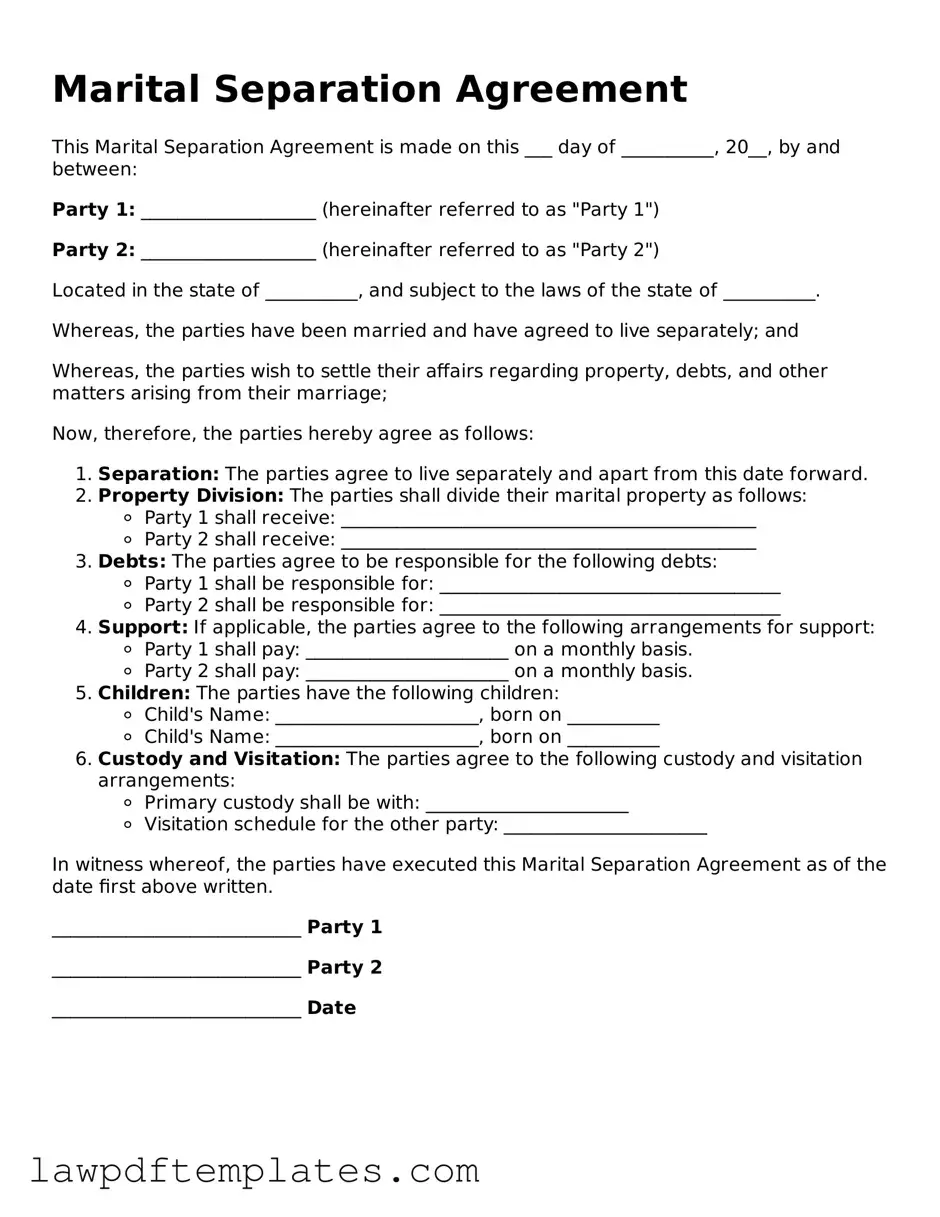Attorney-Approved Marital Separation Agreement Document
State-specific Marital Separation Agreement Forms
Form Breakdown
| Fact Name | Description |
|---|---|
| Definition | A Marital Separation Agreement is a legal document that outlines the terms of a couple's separation. |
| Purpose | This agreement helps to clarify issues such as property division, child custody, and support obligations. |
| Governing Law | The laws governing Marital Separation Agreements vary by state. For example, in California, Family Code Section 1500 applies. |
| Voluntary Nature | Both parties must willingly agree to the terms laid out in the agreement for it to be valid. |
| Not a Divorce | A Marital Separation Agreement does not finalize a divorce; it simply provides a framework for separation. |
| Modification | The agreement can be modified if both parties agree to the changes in writing. |
| Legal Advice | It is often recommended that each party consults with a lawyer before signing the agreement to ensure fairness and understanding. |
Sample - Marital Separation Agreement Form
Marital Separation Agreement
This Marital Separation Agreement is made on this ___ day of __________, 20__, by and between:
Party 1: ___________________ (hereinafter referred to as "Party 1")
Party 2: ___________________ (hereinafter referred to as "Party 2")
Located in the state of __________, and subject to the laws of the state of __________.
Whereas, the parties have been married and have agreed to live separately; and
Whereas, the parties wish to settle their affairs regarding property, debts, and other matters arising from their marriage;
Now, therefore, the parties hereby agree as follows:
- Separation: The parties agree to live separately and apart from this date forward.
- Property Division: The parties shall divide their marital property as follows:
- Party 1 shall receive: _____________________________________________
- Party 2 shall receive: _____________________________________________
- Debts: The parties agree to be responsible for the following debts:
- Party 1 shall be responsible for: _____________________________________
- Party 2 shall be responsible for: _____________________________________
- Support: If applicable, the parties agree to the following arrangements for support:
- Party 1 shall pay: ______________________ on a monthly basis.
- Party 2 shall pay: ______________________ on a monthly basis.
- Children: The parties have the following children:
- Child's Name: ______________________, born on __________
- Child's Name: ______________________, born on __________
- Custody and Visitation: The parties agree to the following custody and visitation arrangements:
- Primary custody shall be with: ______________________
- Visitation schedule for the other party: ______________________
In witness whereof, the parties have executed this Marital Separation Agreement as of the date first above written.
___________________________ Party 1
___________________________ Party 2
___________________________ Date
Common mistakes
Filling out a Marital Separation Agreement can be a complex process, and many individuals make common mistakes that can lead to confusion or legal issues down the line. One frequent error is failing to include all necessary parties in the agreement. Both spouses must sign the document for it to be legally binding. Omitting one spouse’s signature can render the entire agreement invalid.
Another mistake often made is not clearly defining the terms of the separation. Vague language can lead to misunderstandings about responsibilities regarding finances, child custody, and property division. It's crucial to be specific about who is responsible for what to avoid future disputes.
Many people overlook the importance of addressing financial issues comprehensively. This includes not only immediate concerns like spousal support and child support but also long-term considerations such as tax implications and retirement accounts. Neglecting these aspects can create significant financial strain later.
Additionally, individuals sometimes forget to consider the implications of their separation on their children. Child custody and visitation arrangements should be clearly outlined in the agreement. Failing to address these issues can lead to emotional distress for the children and conflict between parents.
Another common error is not updating the agreement after significant life changes. If circumstances change—such as a change in income, relocation, or a new relationship—it's essential to revisit the agreement. Ignoring these changes can lead to complications and disagreements.
Many people also make the mistake of not consulting a legal professional. While it’s possible to fill out the form independently, having legal guidance can help ensure that all necessary details are included and that the agreement complies with state laws. Skipping this step can result in overlooking important legal requirements.
Some individuals fail to keep copies of the signed agreement. It’s vital to retain a copy for personal records and to provide one to the other spouse. Without documentation, enforcing the terms of the agreement can become problematic.
Lastly, procrastination can be a significant pitfall. Delaying the completion of the Marital Separation Agreement can prolong the emotional strain of separation and lead to rushed decisions. It’s better to approach the process thoughtfully and thoroughly to ensure that all aspects are covered.
Popular Templates:
Non Compete Agreement Sample - These agreements emphasize the importance of confidentiality even after employment ends.
Online Promissory Note - The note outlines all responsibilities concerning payment, detailing the borrower's commitment.
For those looking to streamline their vehicle purchase process, obtaining the necessary documentation is essential; you can find the PDF Documents Hub which offers a convenient access point for the Texas Vehicle Purchase Agreement form, ensuring that all required information is readily available for both buyers and sellers.
Rent Agreement Format - The Lease Agreement establishes the responsibilities of both the landlord and tenant.
